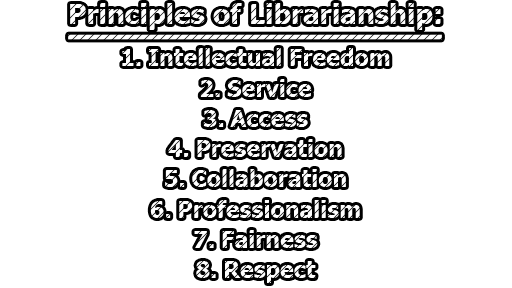Principles of Librarianship:
The principles of librarianship are the foundational ideas and beliefs that guide the profession of librarianship. These principles help to shape the way librarians approach their work, interact with patrons, and manage library collections and resources. Here are some of the key principles of librarianship:
- Intellectual Freedom: Librarians uphold the principle of intellectual freedom, which means that library users have the right to access information without censorship or restriction. Librarians work to ensure that all points of view are represented in the library’s collection and that users have access to information that reflects diverse perspectives and experiences.
- Service: Librarians are committed to providing high-quality service to library users. This includes helping patrons find the resources they need, providing assistance with research and information-seeking, and creating a welcoming and inclusive environment in the library.
- Access: Librarians work to ensure that library resources are accessible to all users, regardless of their background, abilities, or circumstances. This includes providing accommodations for users with disabilities, and working to eliminate barriers to access that may prevent some users from using the library’s resources.
- Preservation: Librarians have a responsibility to preserve and protect library resources, both for current and future generations. This includes protecting materials from damage and deterioration, and providing appropriate storage and handling.
- Collaboration: Librarians recognize the value of collaboration and partnerships, and work to build relationships with other libraries, community organizations, and individuals. By working together, librarians can provide more resources and services to library users and create a stronger and more vibrant library community.
- Professionalism: Librarians adhere to high standards of professionalism in their work. This includes maintaining confidentiality and privacy, providing accurate and unbiased information, and engaging in ongoing professional development and education.
- Fairness: Librarians strive to provide equal access to information and resources for all library users. This means treating all users with fairness and impartiality and not discriminating based on factors such as race, ethnicity, gender, age, religion, or political beliefs.
- Respect: Librarians treat all library users with respect and dignity, recognizing the unique needs and perspectives of each individual. This includes creating a welcoming and inclusive environment in the library and providing assistance and support to users in a respectful and compassionate manner.
It is apparent that the principles of librarianship reflect the values and beliefs that underpin the profession of librarianship. By upholding these principles, librarians can provide high-quality service and resources to library users, and contribute to the growth and development of the library profession.

Former Student at Rajshahi University










